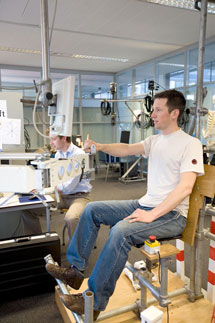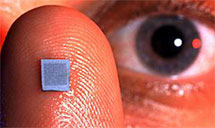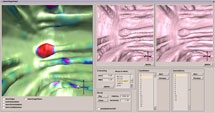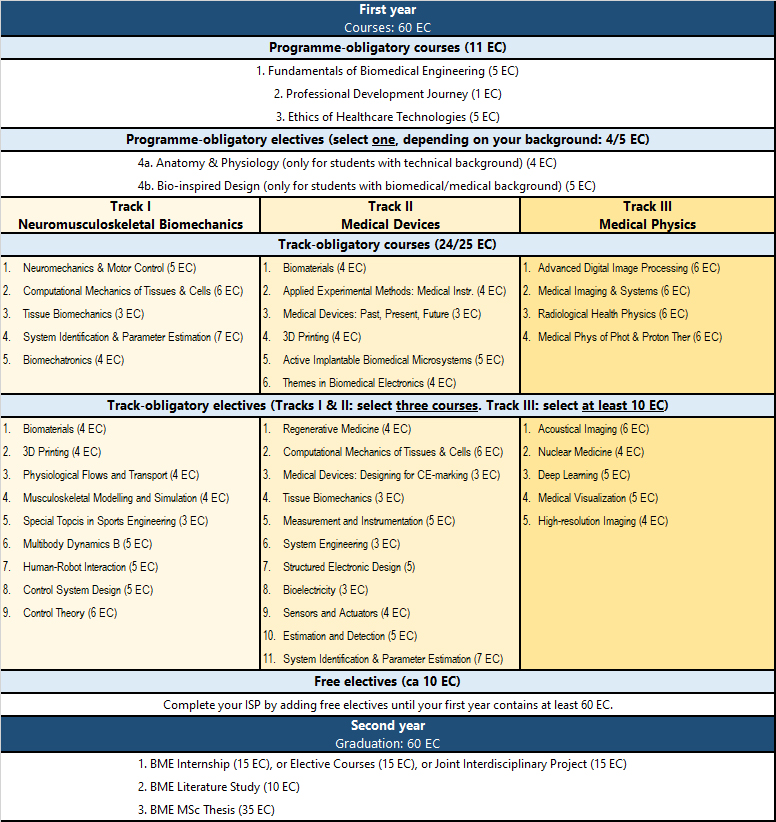MSc Programme
The MSc programme in BioMedical Engineering is a two-year programme and is taught in English.
The programme consists of three tracks:
-
We are living in a very demanding society in which people need increasing help to sustain their mobility and vitality throughout their lifetime. This track is focused on understanding the biomechanics of the neuromusculoskeletal system with the aim to improve the vitality of healthy people, enhance the performance of sports professionals and to treat the patients suffering from neuromusculoskeletal disorders and diseases.
Therefore, the track is focused on relevant tissue biomechanics, biophysical models of muscles and joints, human motion control, interactions between the biological systems (including brain) and (electro)mechanical devices (e.g., neurorehabilitation robots, haptic interfaces, external prostheses, orthoses) as well as an assessment of the effects of sport equipment on the resultant performance.
Students following this track will acquire the fundaments knowledge and research skills for solving increasingly complex and important challenges associated with human movement and control
Courses and research assignments focus on human movement analysis, musculoskeletal modelling, biomechatronics, identification of the (reflexive) control loops in the musculoskeletal system, human-machine interaction, biomaterials, mechanism design, and control theory, 3D printing.
Read more about track II: Medical Devices, track III: Medical Physics or the structure of the BioMedical Engineering programme.

-
This track provides an integrated platform to enable development of advanced medical devices including biomaterials, design models and fabrication processes for implantable devices, biosensors, medical instruments, external prostheses, orthoses, as well as diagnosis and disease monitoring systems.

From novel multifunctional biomaterials to device design and prototype fabrication, and finally testing of the devices in clinically relevant environments, the students are provided the needed theoretical knowledge and are then challenged to prove their concepts by working in state-of-the-art research laboratories. Multidisciplinary teams of teachers and researchers are involved in this track to integrate the relevant topics and provide a focused program.
A wide range of medicals devices is covered. That include: biomaterials and implants able to repair and regenerate diseased tissues,fabricated by integrated technologies involving 3D printing, micro/nanofabrication and surface biofunctionalization, instruments for minimally invasive surgeries, virtual reality trainers and simulators with force/haptic feedback, prostheses, flexible and stretchable electronics and sensor microsystems for medical devices are in the focus of the education and research program of this track.
As already confirmed, the students following this track acquire unique multidisciplinary expertise that makes them ready to face the challenges encountered by the biomedical companies active in these fields as well as by the clinicians and research teams in hospitals, academia and research institutes worldwide. Such specialists represent the guarantee for finding the solution of ‘tomorrow’ related to medical devices for healthcare systems.
Read more about track I: Neuromusculoskeletal Biomechanics, track III: Medical Physics or the structure of the BioMedical Engineering programme.
-
Medical Physics is aimed at the application of physical methods in health care. Medical physicists are responsible for the standardization, calibration, and purchase of medical instruments, in close cooperation with medical and paramedical professionals. Furthermore, they are responsible for the accuracy and safety of physical methods applied in hospitals for diagnosis and therapy.

In the BME Medical Physics track emphasis is placed on Medical Imaging and Radiotherapy. In Medical Imaging methods such as Computed Tomography (CT), Magnetic Resonance Imaging (MRI), and Nuclear Medicine imaging are providing high-quality 3D and 4D information of the human anatomy, but also of its function and its changes over time. The high quality of these images and resulting diagnostic information must be balanced against factors such as acquisition time and radiation burden to the patient. In radiotherapy, medical physicists play a major role in clinical, technical and biophysical concepts resulting in optimized treatment planning. Medical physicists are often involved in research.
As in each BME track, graduates must show competence in cooperating with medical specialists, giving feedback on problems as well as on providing solutions. Professional opportunities lie in medical research, clinical support, and interaction with suppliers and manufacturers of the various devices for acquisition and processing of medical images as well as for providing state-of-the-art radiotherapy.
Read more about track I: Neuromusculoskeletal Biomechanics, track II: Medical Devices or the structure of the BioMedical Engineering programme.
Programme in detail
In the first year the students are expected to take 60 ECTS. The first year of the program consists of obligatory courses for all tracks (14 EC), obligatory courses for each track, and free elective courses. There are two lists of track-specific obligatory courses. The students of each track have to follow all the courses in the first list (24-25 EC) and a selection of three (two for Medical Physics) courses from the second list of obligatory courses. The general goal of these courses is to provide students a solid understanding of fundamentals of the relevant scientific topics as well as the state-of-the-art aspects of biomedical engineering that will allow them to undertake current and future challenges in this multidisciplinary field successfully. Students who have a non-technical background (e.g. biomedical, medical, movement sciences, etc) are obliged to choose an alternative course for the Anatomy & Physiology obligatory course. Suggestions for alternatives will be given by the coordinators of the respective tracks.
The second year involves a traineeship in a biomedical research group or company, a literature survey and an MSc project.
Internship (15 ECTS)
The second year starts with an internship in a biomedical research group or biomedical company. Over the course of their traineeship students undertake a project determined in consultation with the host institute. It is encouraged but not obligatory that Dutch students undertake their traineeship abroad.
Literature study (10 ECTS)
In the literature study students learn to critically review and coherently present information from scientific and other publications. The literature study is generally defined as a preparation for the Masters thesis project. The remainder of the second year is taken up with a Masters thesis project. The traineeship and literature survey may be undertaken in any order.
Master thesis project (35 ECTS)
The Masters thesis project is the final part of the BME programme. In a large number of cases, the project is undertaken in collaboration with a clinical partner. Regardless of whether thesis work is carried out in Delft or at the premises of the clinical partner, every MSc project requires final supervision of a TU Delft staff member.
Students in principle prepare the MSc thesis as a journal paper. Thesis work is evaluated by way of an oral presentation (graduation seminar) by the candidate and an oral examination before an MSc examination committee composed of at least three scientific staff members, including the supervisor and one staff member from outside the research group. The examination committee may also include external examiners from research institutes or from industrial partners.
